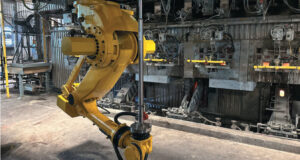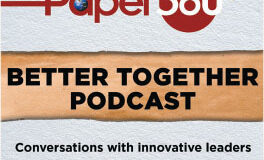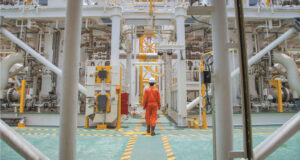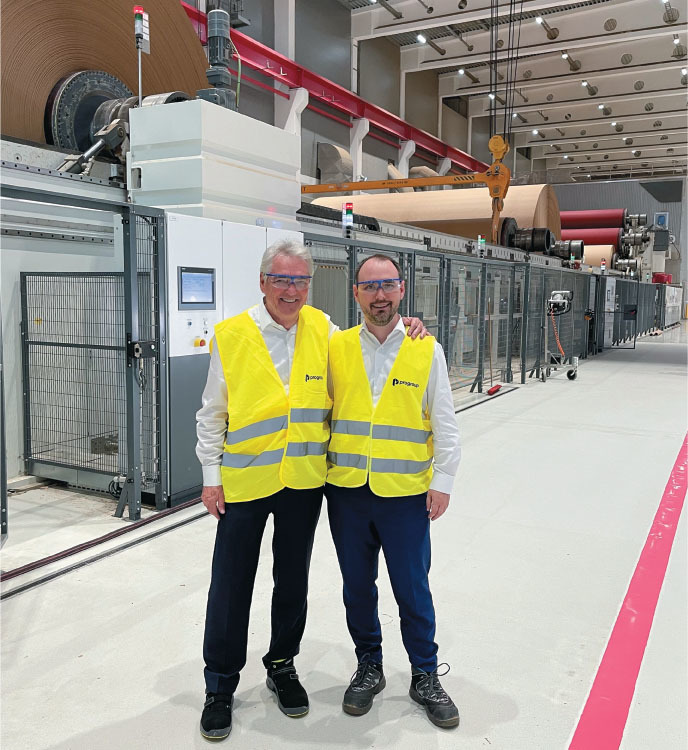
There is no packaging group quite like European company Progroup. Founded only 30 years ago in Offenbach an der Queich, Germany, by Jürgen Heindl, this privately owned family business has gone from a plan on a sheet of paper to a EUR1.3 billion (US$1.38 billion) turnover juggernaut with 12 corrugated sheetfeeder plants, three modern paper mills, a logistics company, and an RDF power plant—with more to come.
Paper360° sat down with Progroup founder Jürgen Heindl and his eldest son Maximilian, who has recently taken the reins as CEO of the company, to talk about what’s next for this dynamic operation. The interview took place in the brand-new administrative offices of its latest greenfield paper mill at Sandersdorf-Brehna in central Germany, which started production in 2020.
It is extraordinary to think that this is one of three Progroup paper mills located relatively close together in this region of the country. Along with the paper mills are 12 large corrugated sheetfeeder plants dotted over central Europe and the UK, with three more either in construction or at the planning stage. The next three plants will be in Western Germany, Italy, and France. The company also has other sheetfeeder plants in Germany, the Czech Republic, Poland, UK, and Italy.
Progroup is No.3 on the list of corrugated board producers in Europe and No. 5 in the production of recycled containerboard. The company ranks 67 on the Paper360° Top 75 Manufacturers list of the world’s largest producers of paper and board.
The group’s three paper mills, PM1, PM2, and PM3, are located respectively at Burg, Eisenhüttenstadt, and here at Sandersdorf-Brehna, all within a 200 km radius. These paper mills supply all the grades needed for production at the corrugated sheetfeeder plants across central Europe and the UK, including lightweight, specialty, and heavier grades.
PM1 is a Valmet machine started up in 2001, with another Valmet lightweight production machine at Eisenhüttenstadt that started up in 2010. PM3 at Sandersdorf-Brehna is a Voith machine that started up in 2020.
BUILD CORRUGATED SHEETING PLANTS AND THE PAPER MILLS WILL COME
Progroup may be large, but it is very lean due to Progroup’s philosophy that it only ever embarks on greenfield projects. Jürgen Heindl explains, “Right from the start of the company in 1991, we have always had a greenfield strategy, always building from scratch and with a high-level of automation and digitalization. Also, we have a policy to standardize when it comes to size and widths of our machines across the whole production chain, whether it’s our corrugated sheetfeeder plants or our paper machines. This blueprint leads to low running costs, which are essential when we are talking about a commodity product such as corrugated board.”
This greenfield strategy has paid dividends as a growth strategy, particularly when it comes to backward integration and the move from being solely a corrugated sheet supplier. There is quite a history associated with Progroup’s rise. “The decision to move into backward integration was something of a dream,” Jürgen Heindl says. “We had a lot of success with our first three sheetfeeder plants, the first of which started up in 1992, and we quickly realized we were using enough paper to fill a paper machine.
“The fact is that 70 percent of the cost of running a corrugated sheetfeeder plant is raw material, as in paper. This meant that we had to buy most of our paper from our competitors; not the ideal situation,” he says. “We wanted to be independent, so I took the great risk of deciding it was time to backward integrate and build PM1 in Burg.”

Progroup’s timing was perfect. In the mid 1990s, the German government was providing a lot of assistance to companies building after the reunification of Eastern and Western Germany. “We were a small company and we got a lot of support from the government, which was needed as backward integration in any industry is highly capital intensive,” says Jürgen Heindl. “We were in the perfect position to design and build a greenfield paper mill where everything could be streamlined to the size and dimensions of our three existing corrugated sheetfeeding plants, so it allowed us to create seamless integration.”
The risk taken on building the first paper mill in Burg (near Magdeburg) paid off, with the first paper machine going into production in 2001. Progroup has continued with its greenfield strategy of developing potential markets, siting corrugated sheetfeeder plants in the ideal locations close to customers and to serve the markets, and then building paper mills to handle the extra capacity. It has seemingly been a bullet-proof strategy that has continued for the last three decades, with the doubling of financial turnover every 10 years.
‘LIKE A MARRIAGE’
New CEO Maximilian Heindl spent some time outside the family business working at machine maker Voith before joining Progroup six years ago. As he talks to Paper360°, he exudes an air of confidence, knowledge, and enthusiasm about the company he will now lead into the future.
“Customer relationships take center stage at Progroup,” says Maximilian Heindl. “Along with the successful greenfield strategy, we take a lot of time and interest in finding out what our customers are doing—their ambitions and their goals. The greenfield strategy has definitely worked, but behind the strategy there is a lot of other important work going on. We work hard at developing various business models that not only ensure our success into the future, but also the success of our customers. This we do by literally getting as close to our customers as we can, which includes siting our corrugated sheetfeeder plants next to their operations.”
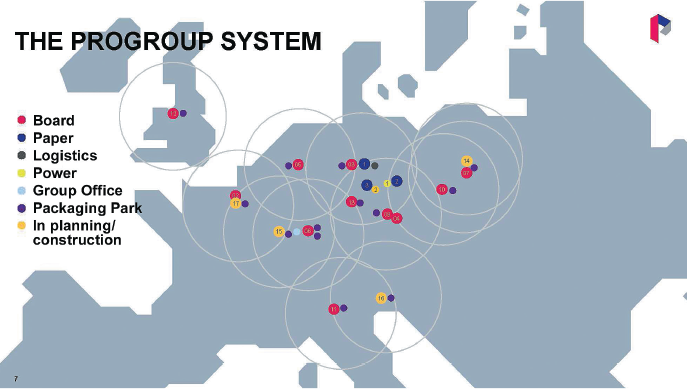
Maximilian Heindl explains the packaging models Progroup has in place to ensure their customers are supported on their own growth journey. There are two main packaging models, 1 and 2, which involve 25-year partnerships where both companies benefit from each other and aim to continue growing together. Part 1 Packaging model envisages a customer locating in the direct vicinity of a Progroup corrugated sheet feeder plant. The Part 2 Packaging model is where Progroup sites a sheetfeeder plant next to the customer.
“With these models we have seen our customers grow by 15-20 percent per year as the synergies between the two sites take out unnecessary cost in terms of transport and packaging,” says Maximilian Heindl. “We also encourage our packaging partners to invest in the latest technology to avoid waste and any extra handling that can cause damage. This is really important to profitability, and we often see our customers double in growth over the space of 6-7 years.
“We carefully select our customers to make sure they are there to grow, and we are there to support them in their endeavors. These companies are often small, privately-owned family businesses that are as ambitious in their growth plans as we are, and the 25-year contracts are much like a marriage between the two companies, with the emphasis on win-win for both parties.”
CHALLENGES AND SUSTAINABLE SOLUTIONS
Of course, in current turbulent times—particularly when it comes to the energy crisis in Europe—it is not all a smooth road of growth and profitability; there are also challenges. Progroup has already installed and started up a Refuse Derived Power Plant (RDF) at its PM2 site in Eisenhüttenstadt in 2011 to produce steam and energy for the site. The group will build its second RDF plant at the Sandersdorf-Brehna PM3 site, which will start up in 2025.
“Yes, there are challenges, particularly when it comes to energy prices and supply volatility. This reinforces our ambition to become independent of fossil fuels. That is why we are again investing in an RDF power plant,” says Maximilian Heindl. “The new plant will provide all the steam we need for PM3 and 50 percent of the power, which will go a long way to decreasing our reliance on the grid and cutting our energy costs.
“But this also fits in firmly with our sustainability strategy where we are working on all the loops and processes to enable us to be a zero waste and zero emission site. This is increasingly part of our strategy across Progroup, particularly as European legislation tightens up.”
The PM3 mill at Sandersdorf-Brehna shows the company’s sustainability goals in action. The new machine, supplied by German manufacturer Voith, has the latest in technology for ultra-efficient production, including a highly efficient drum pulper enabling the reuse of fibers up to 30 times as opposed to the usual 5-7 times.
“We are very proud of this new mill and the PM3 paper machine. Starting from the drum pulper, which enables us a massive improvement in the utilization of raw material, we then maximize efficiency through stock prep as well as having a closed loop water system.”
This sustainability thread also runs through to the corrugated sheetfeeder plants. At its newest start-up plant in Stryków, Poland, Progroup has installed the latest technology from corrugated machine supplier BHS. It ensures a particularly efficient production process as well as optimum corrugated board quality. The result is high-quality Next Board® corrugated board that, compared to conventional corrugated board, scores with a significantly lower use of energy and raw materials and reduces CO2 emissions per metric ton of corrugated board by an average of 26 percent.
“We have always aspired to lead the way when it comes to new technology in the industry, and the Stryków plant is a prime example,” says Maximilian Heindl. “Along with the latest in corrugated technology from BHS, we also have the next generation of combined cooling, heat, and power plants installed at the site. This involves using waste heat from our own power generation, significantly reducing the use of fossil fuels. Our sustainability efforts across the whole of Progroup are all part of our goal to be completely carbon-neutral by 2045.”
WHAT’S NEXT?
Jürgen Heindl symbolically handed over the reins of Progroup to Maximilian at a futuristically-themed event held in Leipzig, Germany, in November last year, almost exactly 30 years since start of production of the first plant. The event was attended by more than 2,300 guests, including politicians, customers, suppliers, and the majority of Progroup employees from production sites across Europe and the UK. As of January 1, 2023, Maximilian Heindl is officially Progroup’s CEO.
So what’s next for Jürgen Heindl? “Well, I will certainly be busy,” he says. “I have always been curious, I like to travel, and I like to learn constantly. In fact, one of the main pillars of Progroup philosophy from the beginning was ‘be fascinated.’
“However, I have around 43 years’ experience in the industry and I will put that to good use as managing director of the holding company. One of the issues I am particularly interested in is succession planning for family and private businesses operating in this sector. This is a very important area—we know this ourselves as Progroup is a family business. To facilitate and assist our customers in this area, we have set up an academy under the holding group designed to strengthen the knowledge of our customers and help them prepare for their own futures by succession planning.”
Reinforcing the family aspect of Progroup, Jürgen Heindl’s younger son, Vinzenz, a trained psychologist, is heading up the Professionals Academy, which works closely with Progroup.
On his own appointment to CEO, Maximilian Heindl says, “Taking the helm as CEO feels like a natural process. I grew up with the company, and now it is my job to drive it further into the next generation. Yes, it’s a big responsibility, which I am well-prepared for and very much looking forward to. One of the most important factors is that I have a great team around me at Progroup, and every great company needs a great team. Together—I am convinced of this—we will continue to successfully write the Progroup story.
“My main focus is to take care of our segment in Europe. This means making sure the customer base stays strong and grows. This we do by offering more creative business models, giving our customers further opportunities. But ultimately it is all about producing a successful product, which involves cost leadership, financing of goals and projects, and cooperation across the board from suppliers to customers. And of course, we must do all this with sustainability at the forefront of our minds.”
Paper360°’s final question about when and where the next paper mill will be built was met first with laughter, and then silence. Both Heindls were clearly holding their cards close to the vest on that.
“Let’s just say that, when there is demand for more paper from our corrugated sheetfeeder plants, there will be another paper mill to provide a solution,” concludes Maximilian Heindl.
It looks like PM4 is in the cards in the near future.
 Paper 360
Paper 360
